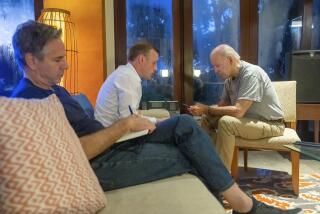‘Calm and Expectant,’ Bush Watches as TV Relays Word on War : White House: President directs press secretary to notify the nation the ‘liberation of Kuwait has begun.’
- Share via
WASHINGTON — In a small study just off the White House Oval Office, President Bush, “calm and expectant” in the words of his spokesman, watched as television relayed word that the most massive military assault since D-Day had begun.
As ABC correspondent Gary Shephard announced that he could see from his hotel room in Baghdad the first shells destroying an Iraqi communications tower, the President, his blue suit jacket discarded, turned to the men gathered around him.
“Just the way it was scheduled,” he said, with Vice President Dan Quayle, national security adviser Brent Scowcroft, and chief of staff John H. Sununu standing by.
Bush then turned to the fourth official in the group, Press Secretary Marlin Fitzwater, and directed him to officially notify the nation that “the liberation of Kuwait has begun.”
For Bush, said Fitzwater, the moment marked the end of a process that had been “five and a half months in the planning.”
For more than three weeks, since he retreated to his Camp David weekend home at Christmas, the President had been working on drafts of the speech he would read later in the evening explaining his decision. And every Sunday night, as he returned from his weekends at the presidential hideaway, he would meet with top aides to further refine the precise military plan that was unfolding, via television, in front of his eyes.
The one-minute statement Fitzwater read had been drafted the day before in anticipation of Wednesday’s assault. But the decision to strike 19 hours after the expiration of the U.N. deadline for Iraq to withdraw from Kuwait had been made days earlier on the basis of “military priorities,” Fitzwater said.
For Bush, the fateful day had begun with a routine schedule. Early in the morning, Secretary of State James A. Baker III, Defense Secretary Dick Cheney and Scowcroft gathered at the White House for breakfast. Scowcroft and Baker then joined Bush for his standard morning national security and intelligence briefings, while Cheney returned to the Pentagon to handle final military preparations.
From all appearances, it was a normal day at the White House. Bush kept a low profile, and gave reporters no hint as he attended a briefing with Education Secretary-designate Lamar Alexander of the momentous decisions he had made.
However, Fitzwater, during his daily briefing for news reporters, warned journalists and other Americans in Baghdad in no uncertain terms to leave town immediately.
The spokesman described the statement as a “last measure of concern by the President and myself.”
The President, he said, had spoken to him repeatedly over the last several days, urging him to warn reporters to leave Iraq, but to do so without giving any hint of when an attack would come.
Later in the day, however, in anticipation of the evening’s actions, Bush and Baker, the President’s long-time friend from Texas and his most senior adviser, had lunch together, with no aides present, in the White House residence. White House photographers later made a picture of the two men walking on the colonnade that borders the Rose Garden.
“You can see the lines of concern in his face,” Fitzwater said, referring to the picture.
Late in the afternoon, the President once again returned to his residential quarters to change clothes and relax. At 6 p.m., he made the short trip down an elevator to the ground floor of the executive mansion and strolled back over to the Oval Office, where he turned on the television set in his study and began to call congressional and world leaders to inform them that the attack had been launched.
More to Read
Get the L.A. Times Politics newsletter
Deeply reported insights into legislation, politics and policy from Sacramento, Washington and beyond. In your inbox twice per week.
You may occasionally receive promotional content from the Los Angeles Times.








